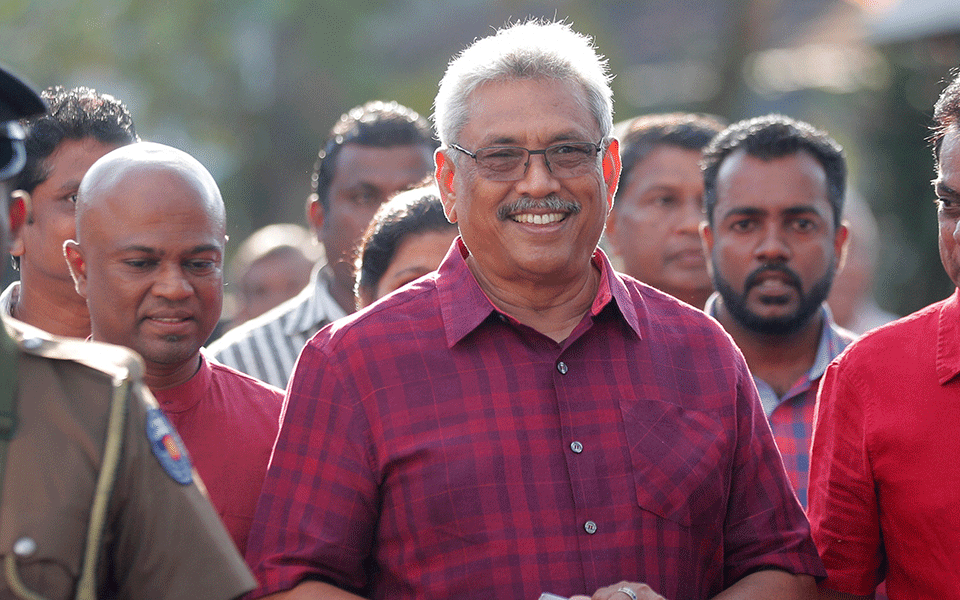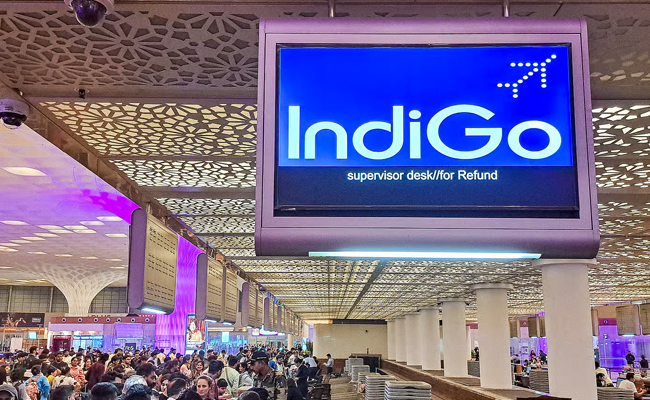Colombo (PTI): Sri Lanka's main Opposition parties on Sunday agreed to form an all-party interim government after the anticipated resignation of President Gotabaya Rajapaksa on Wednesday, following unprecedented political turmoil that forced him and Prime Minister Ranil Wickremesinghe to offer their resignations over the mishandling of the nation's crippling economic crisis.
Opposition parties held talks to seek ways to steer the country forward in the current unprecedented economic crisis after Rajapaksa's resignation.
We agreed in principle to form a government of unity with all parties participation for an interim period," Wimal Weerawansa of the ruling Sri Lanka Podujana Peramuna party's breakaway group said.
This will be a government where all parties are represented," he said.
Vasudeva Nanayakkara, another leader of the SLPP breakaway group said they need not wait for Rajapaksa's resignation on July 13.
President Rajapaksa informed Parliament Speaker Mahinda Yapa Abeywardena on Saturday that he will resign on Wednesday after the country's opposition parties demanded his resignation. Prime Minister Ranil Wickremesinghe has also offered to resign.
The main Opposition Samagi Jana Balawegaya party said they held extensive internal discussions.
We aim for an interim government of all parties for a limited period and then go for a parliamentary election," Ranjith Madduma Bandara, the SJB general secretary said.
The leaders of political parties represented in Parliament are to meet on Monday afternoon to discuss the convening of the House for the transition of power for a new government after Rajapaksa said he will resign.
Speaker Abeywardena conveyed to Rajapaksa on Saturday that Opposition party leaders want him to resign after anti-government protesters stormed his offices and the official residence.
Under the Constitution, the incumbent prime minister would automatically get appointed as the acting president for a short time until Parliament votes and appoint a successor to the president.
The protesters are also demanding the resignation of prime minister Wickremesinghe. The resignation of both the president and prime minister would mean that Speaker Abeywardena would become the acting president.
Wickremesinghe has expressed willingness to resign when a new government is formed.
He stressed on Saturday that to deal with the International Monetary Fund on an assistance programme and to deal with shortages of essentials including food and fuel, it was important not to leave a vacuum.
In a statement Saturday night, Wickremesinghe said this country is gripped with fuel and food shortages. There will be an important visit scheduled by the World Food Programme next week while crucial talks have to be continued with the IMF. So if the current government is to quit it must be replaced by the next ."
Meanwhile, the protesters who have occupied the key administration buildings since Saturday's mass protests said they would not leave until Rajapaksa resigns.
Sri Lankans were seen roaming through the ransacked presidential palace on Sunday. There were no reports of violence unlike on Saturday.
The cash-starved island nation witnessed a tumultuous day on Saturday when protesters broke into Rajapaksa's official residence in Colombo. The protesters were seen in the bedrooms and splashing around in the swimming pool of the President's House.
Protesters did not spare Prime Minister Wickremesinghe despite his offer to resign and set on fire his private residence in an affluent neighbourhood in the capital.
The Speaker would become the acting President in the absence of both the President and the Prime Minister. Later, an election among MPs must happen to elect a new President.
Meanwhile, five Sri Lankan Cabinet ministers have announced their resignation after the massive anti-government protest.
The Chief of Defence Staff General Shavendra Silva on Sunday called on all Sri Lankans to support the armed forces and the police to maintain peace in the country.
In May, President Gotabaya Rajapaksa's elder brother and Prime Minister Mahinda Rajapaksa had to quit in the face of massive anti-government protests.
The Rajapaksa brothers, Mahinda and Gotabaya, were hailed by many in Sri Lanka as heroes for winning the civil war against the LTTE but they are now blamed for the country's worst economic crisis.
The expected exit of President Rajapaksa on Wednesday and the resignation of Mahinda Rajapaksa as Prime Minister in May is a dramatic fall from grace for a powerful family that has dominated Sri Lankan politics for more than a decade.
Sri Lanka, a country of 22 million people, is under the grip of an unprecedented economic turmoil, the worst in seven decades, crippled by an acute shortage of foreign exchange that has left it struggling to pay for essential imports of fuel, and other essentials.
The country, with an acute foreign currency crisis that resulted in foreign debt default, had announced in April that it is suspending nearly USD 7 billion foreign debt repayment due for this year out of about USD 25 billion due through 2026. Sri Lanka's total foreign debt stands at USD 51 billion.
Let the Truth be known. If you read VB and like VB, please be a VB Supporter and Help us deliver the Truth to one and all.
Bengaluru (PTI): The Karnataka government has issued directions to municipal corporations across the state to regulate and prohibit feeding pigeons in public places, citing serious public health concerns.
Deputy Secretary to Government V Lakshmikanth has written to the Urban Development Department requesting it to issue directions to the Greater Bengaluru Authority (GBA) and all municipal corporations to take immediate steps to implement the measures.
In an official note dated December 16 issued by the Health and Family Welfare Department and released to the media on Wednesday, the department said uncontrolled feeding of pigeons in public places has resulted in large congregations of birds, excessive droppings and serious health concerns, particularly respiratory illnesses linked to prolonged exposure to pigeon droppings and feathers such as hypersensitivity pneumonitis and other lung diseases.
ALSO READ: Chinese GPS tracker found on seagull near Karwar Coast
"The commissioner, the Greater Bengaluru Authority and the Commissioners and chief officers of other municipal corporations shall take necessary action to mitigate the causes of dangerous disease spread by pigeon and enforce specified guidelines in their respective jurisdiction," the note said.
According to the department, these include a prohibition on feeding pigeons or causing pigeons to be fed in areas where it may cause nuisance or pose a health hazard to the public. Pigeon feeding shall be permitted only in designated areas in a controlled manner, subject to certain conditions.
"The designated areas may be selected in consultation with stakeholders. The responsibility for upkeep of the designated areas and compliance to the directions shall be taken up by some charitable organisation or an NGO. The feeding in designated areas shall be permitted only for some limited hours in the day," it said.
The note further stated that authorised officers of local authorities shall issue on-the-spot warnings and may impose fines for violation of the order, or lodge complaints to prosecute offenders under Sections 271 (Negligent act likely to spread infection of disease dangerous to life) and 272 (Malignant act likely to spread infection of disease dangerous to life) of the Bharatiya Nyaya Sanhita.
It also directed local authorities to conduct public awareness campaigns, including the display of signboards, banners and digital messages, explaining the health hazards associated with pigeon droppings and feathers, the content of the regulatory directions and penalties for violations, and alternative humane methods of bird conservation that do not endanger public health.





